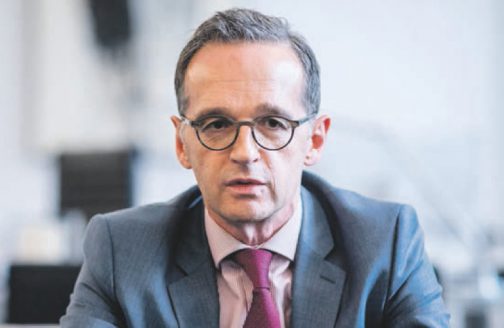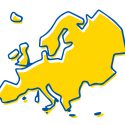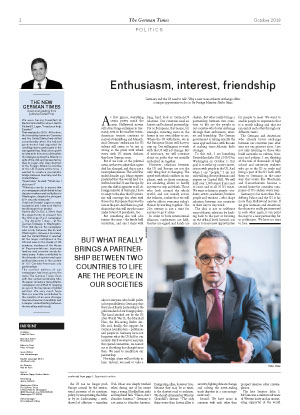Germany and the US need to talk. Why a new trans-Atlantic exchange offers a unique opportunity to do so.
 Heiko Maas | photo credit: DPA/KAY NIETFELD
Heiko Maas | photo credit: DPA/KAY NIETFELD At first glance, everything seems pretty much the same. Hollywood movies still attract huge audiences in Germany, even in the smallest towns. American tourists continue to marvel at Heidelberg and Munich. And Germans’ enthusiasm for US culture still seems to be just as strong as the pride with which every sixth US citizen declares they have German roots.
But if we look at the political arena, we have to admit that a great deal has changed, and this is not a recent phenomenon. The Cold War ended decades ago. Many experts predicted that this would lead to a shift in how the US sees Europe. By now, this shift is apparent to all. As foreign minister of Germany, I have to adapt to the idea that US priorities will converge less often with those of us Europeans than was the case in the past. And there is a good chance that this will stay the same under future US presidents, too.
But something else will also remain the same – the firmly held conviction, and one I share with almost everyone who holds political responsibility in Germany, that the trans-Atlantic partnership is the gold standard of our foreign policy. The hand reached out by the US after World War II; the Marshall Plan; the life-saving Berlin Airlift; and, finally, the support for German reunification – politicians and people in Germany have not forgotten what the US did for our country. But if we want to maintain this special connection, we cannot act as if nothing has changed since then. We need to recalibrate our partnership.
Nostalgia alone will not help us here. Instead, we need to take a long, hard look at German-US relations. Our countries need an honest and balanced partnership. For us Europeans, that means, for example, investing more in the future in our own ability to act. Where the US withdraws, we in the European Union will have to step up. Our willingness to work with the US will not change. But if necessary, we will continue alone on paths that we initially embarked on together.
However, relations between the US and Europe are not the only thing that is changing. The speed with which conflicts on our planet, with its finite resources, are escalating allows us hardly any time to stop and think. Those who look around the whole world, and not merely across the Atlantic, realize that we will only be able to overcome today’s threats by working together. The 21st century is not a time for anyone to go it alone.
In order to form international alliances, conferences are held, treaties are signed and hands are shaken. But what really brings a partnership between two countries to life are the people in our societies who foster exchange through their enthusiasm, interest and friendship. The German government is taking exactly the same approach here, with the aim of making trans-Atlantic links stronger.
To this end, I am launching Deutschlandjahr USA 2018/19 in Washington on October 3. Our goal is to strike up a new conversation with people in the US. And when I say “people,” I am not only talking about politicians and experts on Capitol Hill. We will hold over 1,000 events from coast to coast and in all 50 US states. We want to listen to people – students, artists, academics, business people and teachers – who shape relations between our countries in their day to day work.
The idea is not to celebrate trans-Atlantic relations by harking back to the past or focusing on the official level. Instead, our aim is to create new opportunities for people to meet. We want to enable people to experience that it is worth talking and that we can enrich each other through our different views.
The Germans and Americans who already foster exchange between our countries year after year are our greatest asset. I am not only referring to those who build networks in culture, business and politics. I am thinking of the tens of thousands of high school and university students who go to the US to study and bring a part of the US back with them to Germany, in the same way that towns like Wiesbaden and Kaiserslautern become a second home for countless companies of US soldiers every year.
Germany is far more than Heidelberg Palace and the US is far more than Hollywood movies. If we give Germans and Americans the chance to really get interested in each other again, it can point the way to a new partnership for us politicians. We have no time to lose.
Heiko Maas
is Foreign Minister of the Federal Republic of Germany.



